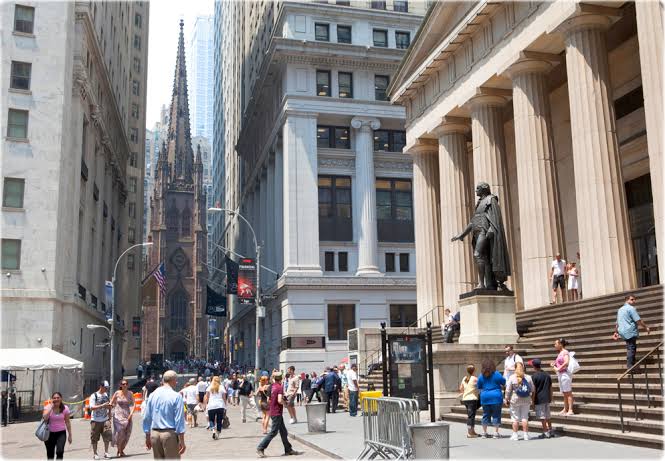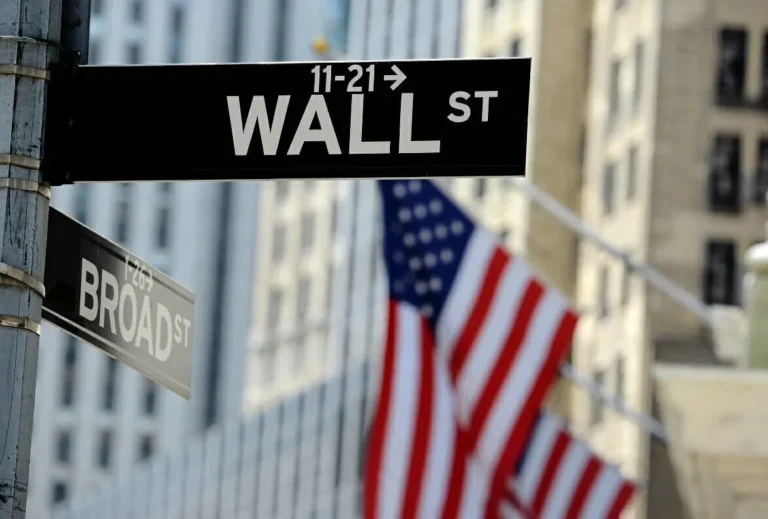Wall Street is a central hub in the global economy, symbolizing the financial sector’s role in shaping economic activity not just in the United States, but around the world.
Known for its prominent role in financial markets, particularly through the New York Stock Exchange (NYSE) and Nasdaq, Wall Street serves as a critical space where capital is raised, investments are made, and financial decisions are executed.
Its influence extends beyond the physical confines of the financial district, as the activities occurring there reverberate throughout global markets. The financial decisions made on Wall Street can affect everything from individual investment portfolios to national economic policies and even the global economic climate.
Given its importance, understanding Wall Street’s influence requires recognizing its intersections with both the global economy and media, as the information disseminated from this financial epicenter often shapes public perception and policy decisions.
The relationship between Wall Street and the global economy is one of mutual dependency. Financial institutions on Wall Street provide capital that fuels businesses and industries across various sectors. These businesses, in turn, contribute to economic growth and employment.
When companies go public through initial public offerings (IPOs), they raise funds to expand operations, research, and development, or even enter new markets. This creates a ripple effect, fostering innovation, job creation, and long-term economic prosperity.
Moreover, Wall Street’s role in facilitating mergers and acquisitions, lending, and other forms of investment contributes to the movement of capital on a global scale, affecting economies worldwide. When Wall Street experiences volatility, its ripple effect can send shockwaves through the global financial system, influencing economies even in distant regions.
As much as Wall Street influences the economy, it also plays a role in how the public understands financial matters. Media outlets like the Wall Street Journal hold significant sway in shaping public perception of economic trends and market movements.
The media is tasked with reporting on financial activities, offering analysis on market performance, and providing insights into economic forecasts. Through its daily reports and expert commentary, the Wall Street Journal delivers valuable information to investors, policymakers, and the public at large.
This publication, along with others, helps inform readers on important events that affect stock prices, inflation rates, and overall market sentiment.
In this sense, the media serves as a bridge between Wall Street’s often technical, jargon-heavy environment and the broader public, enabling everyday individuals to make sense of complex financial phenomena.
Beyond traditional media, the influence of Wall Street is further magnified by the growth of digital media. Online platforms, social media, and financial news apps provide real-time updates on market conditions, allowing investors and ordinary individuals alike to monitor and react to global financial events as they unfold.
However, with the increasing availability of financial information, there also comes the challenge of misinformation and speculation. Media outlets must navigate the fine line between providing helpful financial advice and sensationalizing events for greater viewership or readership.
The speed at which news spreads has led to the rise of “market-driven media,” where news outlets often drive economic activity by their coverage of certain stocks, sectors, or geopolitical developments.
In addition to the role of traditional financial journalism, media also plays an important role in influencing financial literacy among the general population.
Shows like Sesame Street, which are designed for younger audiences, subtly introduce financial concepts in an accessible and engaging way. These programs, through their educational content, help lay the foundation for an understanding of money, savings, and spending habits.
By incorporating simple financial lessons into their storytelling, such shows contribute to the development of early financial literacy, making it possible for children to begin learning about these concepts at a young age.
Uch programs may not directly discuss Wall Street, but they provide valuable financial education that, over time, shapes the way individuals approach money management, investment, and economic participation.
As individuals grow older, their understanding of financial concepts deepens, and the media continues to influence their perceptions of economic systems. The Wall Street Journal and other similar outlets offer more in-depth analysis, often breaking down complex economic policies, stock market movements, and global financial trends.
Financial news networks like CNBC or Bloomberg offer live coverage of market events, and their analysts provide viewers with the latest economic forecasts and company-specific updates.
These outlets influence how people interpret shifts in the economy, whether it is through the announcement of interest rate changes by the Federal Reserve or the introduction of fiscal policy reforms.
For those with direct financial interests, the insights offered by these media outlets help guide investment strategies, manage risk, and inform decisions related to savings, spending, and retirement planning.
In today’s digital age, information spreads rapidly, and the immediacy of media coverage has the potential to influence both investor behavior and economic outcomes. For instance, a tweet from a prominent investor or a breaking news story about a company’s earnings report can cause stock prices to swing dramatically in a matter of minutes.
Social media platforms have made it easier for financial information to go viral, allowing individuals to react instantaneously to news that once took days or weeks to circulate.
This speed of information can lead to heightened market volatility, as investors may respond impulsively to media reports without fully analyzing the underlying fundamentals of the situation.
The role of media, then, becomes crucial not only in disseminating accurate information but also in curbing the spread of speculation or fear-driven market movements.
At a broader level, Wall Street and the media both play an integral role in shaping public understanding of the global economy. While Wall Street functions as the engine of financial markets, the media acts as the conduit through which the public gains access to information about these markets.
The connection between these two forces underscores the importance of informed decision-making. For individuals looking to participate in the financial system, the media provides the insights necessary to make sound financial choices.
Whether through traditional outlets like the Wall Street Journal or educational programming aimed at young people, the media shapes the financial landscape in ways that influence both the economy and society as a whole.
Read Also: How Western Union Facilitates International Money Transfers and Payments
The Influence of Wall Street on Global Financial Markets and Pop Culture

The financial markets play a central role in the global economy, acting as a crucial point of connection for businesses, investors, and governments. As the world’s financial markets continue to evolve, their influence has extended far beyond the confines of the trading floors.
The financial district in New York City, often symbolized by its renowned stock exchanges, has become a key player in shaping global economic policies, affecting markets worldwide, and influencing cultural perceptions of wealth and success.
This district’s impact can be seen in everything from media portrayals to personal finance, as it has come to represent both the promise and the pitfalls of capitalism.
The role of the financial markets in economic growth cannot be overstated. These markets provide companies with a platform to raise capital, while giving investors an opportunity to profit from stock purchases, bonds, and other assets.
The performance of the stock market directly impacts the global economy, influencing everything from national policies to personal investments. Large-scale economic shifts, such as recessions or periods of growth, are often directly tied to the movements in these financial hubs.
As a result, the markets have become more than just places for transactions—they are key indicators of the global economic health.
The influence of these markets is further amplified by the role that media outlets play in shaping public perceptions of finance. News organizations, financial publications, and digital platforms all serve to inform the public on market movements, economic trends, and the policies that shape the industry.
In particular, outlets like The Wall Street Journal and Bloomberg offer comprehensive coverage of financial news, offering investors and consumers valuable insights into market developments.
These publications often shape how individuals and institutions understand the financial world, from trends in stock prices to broader economic policies.
The portrayal of financial markets in the media is not confined to news reports alone. The world of finance is often depicted in movies, television shows, and documentaries, many of which focus on the moral and ethical complexities that come with wealth generation.
Movies such as The Wolf of Wall Street highlight the excesses of financial trading, emphasizing the extravagant lifestyles of stockbrokers and the ethical compromises they may make in pursuit of wealth.
These kinds of films, while entertaining, can often skew public perceptions of the financial sector, reducing its complex dynamics to a series of sensationalized images that focus on greed and corruption.
Such portrayals, while entertaining, also contribute to a particular narrative about the financial world. The stereotypical image of the unscrupulous trader or the high-risk, high-reward nature of financial speculation often dominates discussions in popular culture.
These depictions can lead to a misunderstanding of the diversity of roles within the financial industry. Not all market participants are driven by profit at any cost. There are many professionals in the financial sector who focus on risk management, investment strategies, and ensuring that the system remains stable and ethical.
In contrast to these dramatic portrayals, the real financial world is often far more regulated and methodical. Behind the high-profile traders and major investment banks, there are countless professionals who focus on ensuring that financial markets operate smoothly.
Regulatory bodies, financial analysts, investment advisors, and corporate finance specialists all play essential roles in managing the stability of the financial ecosystem.
They work within a framework of laws and regulations designed to prevent the kinds of market abuses that are sometimes depicted in the media. Unfortunately, these more subdued and less glamorous aspects of finance rarely make it into popular portrayals, where the focus tends to remain on sensational stories of wealth and scandal.
The media’s influence over public understanding of financial markets extends beyond entertainment and news reports. Television shows, documentaries, and educational programming also play an important role in shaping how people think about money, wealth, and financial systems.
Shows like Billions have introduced audiences to the intricate relationships between the financial world, politics, and power, depicting the often complex and morally ambiguous decisions that market participants make.
These shows often explore the tension between ambition and ethical conduct, illustrating the risks and rewards of financial decision-making.
While these portrayals can be educational and thought-provoking, they too tend to oversimplify the financial world, presenting it as a battleground of personal interests rather than a complex system that includes both competition and cooperation.
Despite these oversimplified portrayals, it is important to recognize the broader context in which financial markets operate. The true value of financial markets is not necessarily found in the flashy images of luxury or the high-stakes drama seen in films and television shows.
In reality, financial markets are essential for economic growth. They allow companies to raise the capital necessary for innovation and expansion, creating jobs and driving progress. These markets also provide a means for individuals to invest and build wealth, offering a variety of opportunities for personal financial growth.
Additionally, financial markets are key to ensuring that resources are allocated efficiently across the global economy. The flow of capital to businesses and governments facilitates the development of new technologies, infrastructure, and services, which ultimately benefit consumers and society as a whole.
In this sense, the financial sector can be seen as the lifeblood of the economy, allowing money to move between investors and institutions, and ensuring that it is used in ways that support long-term growth and stability.
The depiction of financial markets in popular culture has also had a profound impact on personal finance. As individuals become more interested in managing their finances and investing, they often turn to the media for guidance.
Books, blogs, and podcasts about personal finance have surged in popularity, and many of these resources provide insights into investment strategies, budgeting, and managing wealth.
These resources have made financial education more accessible, allowing individuals to take control of their financial futures and make informed decisions about how to grow and protect their wealth.
Moreover, the media’s portrayal of financial crises and their aftermath has led to widespread discussions about regulation and oversight. Major economic downturns, such as the 2008 financial crisis, prompted calls for greater transparency and accountability in financial markets.
Public sentiment, shaped by media coverage, has led to significant regulatory reforms aimed at preventing the kinds of abuses and mismanagement that contributed to the crisis. These changes have altered the landscape of the financial industry, making it more resilient and more focused on protecting consumers.
Read Also: How to Choose the Perfect Ashley Furniture for Your Home
The Role of Wall Street in Shaping Global Economic Policies and Public Opinion

Wall Street has long been a symbol of the financial power and influence that drives much of the global economy. As the epicenter of the American financial system, it represents more than just the trading of stocks and bonds; it is a crucial hub that impacts economic policy, global markets, and public perception.
Wall Street plays an essential role in shaping economic policies, not only through its actions in the financial markets but also through its influence on public opinion and policymaking.
The media, particularly outlets such as The Wall Street Journal, and cinematic portrayals in films like The Wolf of Wall Street, significantly contribute to how the public perceives this vital sector of the economy and its impact on global economic affairs.
At the heart of Wall Street’s influence lies its capacity to shape economic policy. The financial institutions based in the area, including major investment banks, hedge funds, and private equity firms, have an unparalleled ability to impact markets.
The decisions made by these institutions, whether through stock trading, investment strategies, or corporate mergers, can reverberate throughout the global economy.
This, in turn, affects the decisions made by policymakers, both in the United States and abroad. Wall Street’s financial activity often provides the necessary signals for governments and regulatory bodies to adjust their economic policies.
For instance, when there is a significant shift in stock market trends or when corporate earnings reports fall short of expectations, policymakers may alter fiscal or monetary policy to stabilize the economy.
Central banks, including the Federal Reserve, monitor financial markets closely, and their decisions regarding interest rates and other financial measures are often influenced by the health of Wall Street.
Similarly, changes in stock market valuations can prompt shifts in government spending or taxation policies. Wall Street’s sway over economic policy decisions extends beyond the United States, influencing global financial markets, especially in economies that rely on trade and investment from American financial institutions.
However, the influence of Wall Street is not confined solely to policymakers and financial experts. The media plays a crucial role in shaping how the public understands the impact of Wall Street on global economic affairs.
Newspapers, television programs, and digital platforms help communicate the latest developments in financial markets, often framing the discussion around broader economic consequences.
The Wall Street Journal is one of the most prominent examples of media coverage that shapes public perception of Wall Street and its influence on global economic policies.
As a leading financial publication, The Wall Street Journal reports on market movements, policy changes, and economic trends, offering in-depth analysis and expert commentary. Its coverage often influences the way investors, business leaders, and consumers perceive the state of the economy and the role that Wall Street plays in shaping it.
The media’s portrayal of Wall Street extends beyond traditional financial publications. Movies and television shows, particularly those based on real-life events, have played an essential role in shaping the public’s understanding of Wall Street’s practices.
Films like The Wolf of Wall Street have contributed to the perception of Wall Street as a place of excess, greed, and unscrupulous behavior. Based on the memoir of stockbroker Jordan Belfort, the movie portrays the chaotic, morally questionable practices of the financial sector in the 1990s, focusing on the rise and fall of a stockbroker who engaged in fraudulent schemes.
While the film is a work of fiction based on real events, it offers a highly dramatized and exaggerated portrayal of Wall Street, leading many viewers to associate the entire financial industry with unethical behavior and risk-taking.
The popularity of films like The Wolf of Wall Street has shaped the cultural narrative surrounding Wall Street, often focusing on the more sensational aspects of the industry.
While such portrayals reflect real instances of corporate corruption and financial scandals, they also reinforce the stereotype of Wall Street as a place driven solely by greed and the pursuit of profit at any cost.
This can create a distorted view of Wall Street’s role in the economy, overshadowing the more productive and ethical aspects of the financial markets. In reality, Wall Street is home to a wide range of financial professionals, including risk managers, analysts, and compliance officers, who work to ensure that markets operate within the bounds of regulatory frameworks.
Furthermore, the media’s portrayal of Wall Street in film and television often fails to capture the complexities of financial systems and the global economic landscape.
The portrayal of Wall Street as a place of high-stakes trading and financial manipulation can create a misleading view of how global economic policies are shaped. In reality, the decision-making process behind economic policies is multifaceted and involves input from various sectors, including government officials, economists, and financial experts.
While Wall Street undoubtedly plays a significant role in influencing economic policies, it is only one piece of the puzzle. Policymakers must also consider broader economic factors, such as unemployment rates, inflation, and international trade, when making decisions that affect the global economy.
The influence of Wall Street on public opinion is also evident in how the media shapes attitudes toward financial regulation and corporate behavior. Over the years, public trust in financial institutions has been shaken by scandals such as the 2008 financial crisis, which was largely precipitated by the reckless behavior of major financial institutions.
In the aftermath of the crisis, there were widespread calls for greater regulation of the financial sector to prevent similar occurrences in the future.
Media coverage of the crisis, including documentaries, news reports, and books, played a key role in shaping public opinion about the role that financial institutions on Wall Street played in the crisis. This, in turn, influenced the public’s view on the need for stronger regulations and oversight.
The relationship between Wall Street, economic policy, and public opinion is complex and dynamic. Wall Street has a significant influence on economic policy through its actions in the financial markets, which can prompt policymakers to adjust fiscal and monetary policies.
The media, particularly outlets like The Wall Street Journal, plays a central role in shaping public understanding of Wall Street’s impact on global economic affairs, offering insight into financial trends and policies.
At the same time, popular media, including films like The Wolf of Wall Street, can shape public perceptions of Wall Street’s ethical practices, sometimes reinforcing negative stereotypes.
These portrayals can contribute to a skewed understanding of the financial world, focusing on the more sensational aspects of Wall Street while overlooking its essential role in economic growth and stability.
Frequently Asked Questions on How Wall Street Shapes the Global Economy

1. What is Wall Street’s role in shaping global economic policies?
Wall Street plays a significant role in shaping global economic policies by influencing market trends, investment decisions, and financial instruments.
As the center of the U.S. financial markets, Wall Street impacts policy decisions made by government bodies such as the Federal Reserve, and its actions in the markets can prompt adjustments in fiscal and monetary policies. These policies, in turn, affect the global economy, particularly in countries that rely on U.S. economic stability and trade.
2. How does Wall Street influence public opinion about the economy?
Wall Street influences public opinion by being the subject of media coverage, particularly in major financial outlets like The Wall Street Journal, and through popular media portrayals in films and television.
This coverage shapes public perceptions of the economy, stock market trends, corporate behavior, and financial regulations. Through media narratives, Wall Street is often associated with both economic prosperity and, at times, corporate greed, which contributes to the public’s understanding of the financial system.
3. What role do films like The Wolf of Wall Street play in shaping perceptions of Wall Street?
Films like The Wolf of Wall Street portray Wall Street as a place of excessive risk-taking, unethical behavior, and financial manipulation.
While these films are based on real-life events, they often exaggerate the more sensational aspects of Wall Street, leading the public to associate the entire financial sector with greed and corruption.
This portrayal can create a skewed perception of Wall Street, overshadowing its more positive contributions to the economy, such as job creation, innovation, and investment.
4. Does Wall Street only impact the U.S. economy, or does it have global implications?
Wall Street has far-reaching global implications due to the interconnectedness of international markets. As the hub of the U.S. financial system, the activities that take place on Wall Street affect not only U.S. markets but also global financial markets.
For example, fluctuations in U.S. stock prices, investment trends, and financial regulations can have cascading effects on global trade, foreign investments, and even the economies of developing nations.
5. How does the media, such as The Wall Street Journal, affect Wall Street’s public image?
The media, especially financial publications like The Wall Street Journal, plays a significant role in shaping the public’s image of Wall Street.
By providing in-depth reporting on market trends, economic policies, and corporate actions, the media informs public opinion about the financial system. The way Wall Street is portrayed—whether positively or negatively—can influence how investors, consumers, and policymakers view the financial sector and its role in the economy.
6. Is Wall Street responsible for the global financial crises?
While Wall Street’s practices have contributed to some financial crises, such as the 2008 global financial crisis, it is important to recognize that the causes of such crises are multifaceted.
Wall Street’s risky lending practices, speculative investments, and lack of proper regulation played a role in the financial crash, but factors such as government policies, global economic conditions, and international trade practices also contributed. The crisis highlighted the need for stronger financial regulations and oversight to prevent future instability.
7. How do Wall Street firms influence global trade and investment?
Wall Street firms, including investment banks and hedge funds, have a profound influence on global trade and investment due to their ability to allocate capital across international markets.
These institutions provide funding to businesses and governments, facilitate mergers and acquisitions, and create investment products that attract global investors. Their decisions can determine the flow of capital, influencing the growth of industries, currencies, and even the economic stability of nations worldwide.
8. What impact does Wall Street have on everyday consumers?
Wall Street’s impact on everyday consumers is often indirect but significant. The financial markets influence interest rates, housing prices, and the cost of living.
For example, when Wall Street firms succeed or fail, it can impact stock markets, which in turn affect pension funds, retirement savings, and overall consumer confidence. Additionally, Wall Street firms have a hand in determining the availability of credit and loan terms for consumers, influencing their purchasing power and financial security.
9. How does Wall Street contribute to economic innovation and job creation?
While often criticized for its role in financial speculation, Wall Street also plays a vital role in fostering economic innovation and job creation.
Through venture capital and private equity, Wall Street firms provide funding to startups and growing companies, driving technological advances and new business models.
The financial sector also supports infrastructure projects and large-scale industries that generate employment opportunities, contributing to the overall health and growth of the global economy.
Read Also: Kim Kardashian West Collections @SKIMS
Do you have any questions, suggestions, or contributions? If so, please feel free to use the comment box below to share your thoughts. We also encourage you to kindly share this information with others who might benefit from it. Since we can’t reach everyone at once, we truly appreciate your help in spreading the word. Thank you so much for your support and for sharing!






